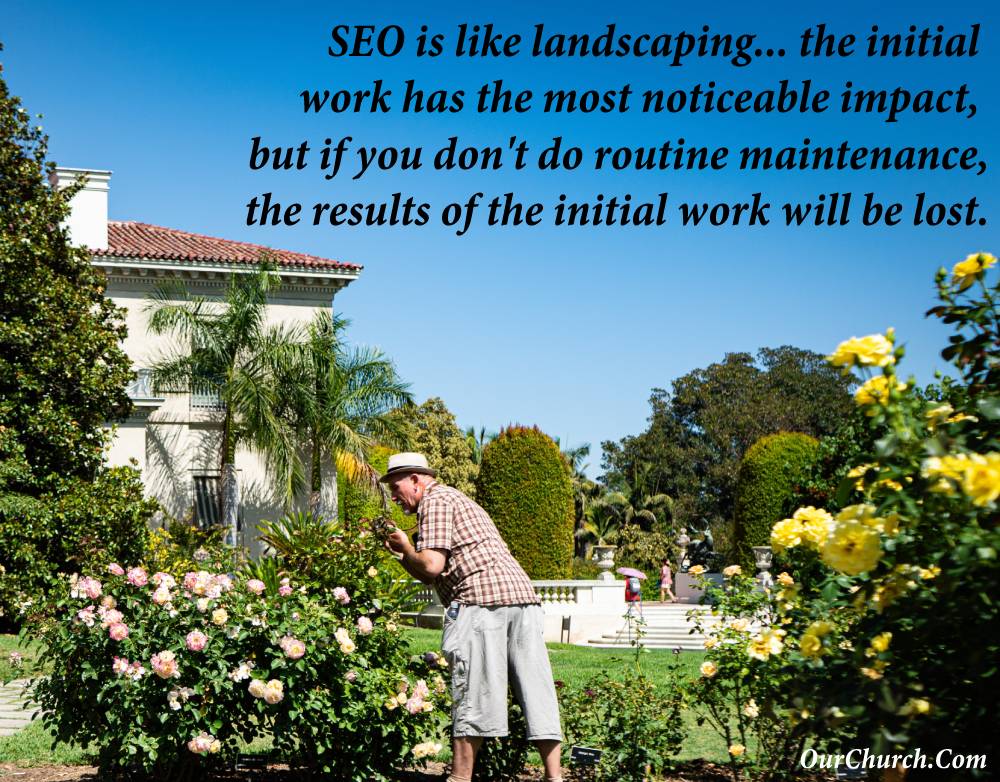Is search engine optimization (SEO) a one-time project or an ongoing process?
It’s an important question to answer before investing in SEO.
Can I optimize my website for search engines once and it will rank well for my targeted keywords from that point forward, or do I need to continue to monitor and manage the optimization after the initial optimization?
To answer that question, let me share with you the story of one of our SEO clients…
The Client:
As they used to say at the start of Dragnet, the following story is true, but the names have been changed to protect the innocent. I have purposefully omitted the name of the organization, but wanted to give a little background information about them.
The client is a large Christian publishing company with several departments and hundreds of products and services who offers great Christian curriculum options for both children and adult.
They host their website with another web host (not OCC) and have a team of web designers who control their website design. Our contacts, the heads of the product lines, did not have control over website itself and because of the size of the company and complexity of the website; they decided to have their web team implement the optimization as per our instruction.
The Service:
The primary service OurChurch.Com provided was SEO Management. With this service, OurChurch.Com:
- Performs in-depth keyword research
- Optimizes web pages for the best keywords
- Monitors the optimization of the pages
- Runs regular search ranking reports
- Keeps the optimization practices current
The Initial Results:
With each page optimized, the initial results in the search engines were dramatic. On average, we were able to reach 50 top ten, 37 top five, and 14 #1 rankings for each page.
Incident 1: The Sudden Drop
After having optimized several pages and maintained many of them for a couple of months, the rankings suddenly dropped for all of the pages we had optimized. We discovered this during a review of the search ranking report we send our clients each month.
We immediately reviewed the web pages we were maintaining and discovered that much of the optimization of these pages had been lost.
It turned out that the web design team made some changes to the client’s entire site and inadvertently removed some of the optimization. We notified the client of the issue and they were able to quickly re-optimize the pages. Within a week the top rankings were returning for all of the pages.
Incident 2: Duplicate Content
A few months later, the rankings for several of the pages started dropping again, this time more gradually. We made a few adjustments to the optimization of the pages and continued to monitor the pages, but the rankings continued to drop. This decrease in rankings was a bit baffling. All of the typical things that may cause a website’s rankings to decrease looked fine.
Then we did some manual checking of the keywords in the various search engines and made a discovery: the rankings had not actually dropped but shifted to different pages.
After further research, we found that they had performed another significant web design change and created duplicates of each of the websites. Some of the search engines were now listing the duplicate web pages instead of the original pages.
We responded by prescribing some changes to the code of the websites to ensure the search engines would not penalize the client’s site for duplicate content issues. Then we adjusted our reports to show rankings for all of their pages.
Incident 3: Another Drop In Rankings
The next incident occurred when the client made some major changes in the structure of their website and the website’s design. Two of the pages we are managing were affected in the website redesign. Much of the optimization was lost and rankings began to fall.
I would love to tell you that we contacted the client about the issue immediately and once again they were able to reapply the optimization and regain their rankings. We did contact them about it immediately, however, this time due to the continuing changes in how the company managed their website, the client decided not to re-optimize the pages.
At the time this article was published, the pages had less than half the top ten rankings they had just a few months before and lost most of their #1 rankings.
So, is ongoing SEO management important?
I think we can say without a doubt, “Yes, case closed!”
SEO is a lot like landscaping…
The initial landscaping takes a lot of work and costs quite a bit. It makes the business or church look a lot better.
If you just left it at that, it wouldn’t take long before weeds started growing and flowers started withering. After a few months the landscaping that was making your location look great is now an eyesore making the investment in landscaping worthless.

However, if you have the landscaping company come out every couple of weeks to maintain the landscaping, it will continue to look great. It costs a little more, but you continue to experience the benefits of the initial investment.
An SEO Management service is similar in that it keeps your website optimized, producing traffic and leads.
As illustrated in this case study, ongoing SEO Management has several benefits, but the three biggest benefits are:
- It allows you modify the content of your website and keep it current with fresh content without having to worry about losing your positions in the search engines.
- It protects you from changes to your website that inadvertently affect the optimization of your website and changes within the search engines that affect rankings.
- Keeps you informed of your current situation in the search engines and allow you to address issues that may come up.
And there is one more benefit that comes with an ongoing SEO Management service: peace of mind.
If you’re interested in talking with an experienced Christian SEO expert about how SEO can hep your organization better live out its mission online, complete the form below to schedule a call.
Comment and Discuss
- What are your thoughts on the importance of ongoing SEO management?



1 Comment
I think the is… there are a lot of people working on this websites. Why did they separated the optimization ang the design team? There is a high percentage that the codes will be changed anytime they made changes to the site. For people who optimize their site alone putting games to your site can help you drive traffic to your site with the combination of off-page and on-page optimization that includes backlinking, posting blogs, link trading and a lot more.